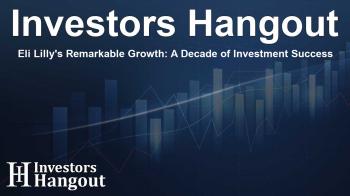Eli Lilly's Remarkable Growth: A Decade of Investment Success

Understanding Eli Lilly's Investment Journey
Eli Lilly has demonstrated a remarkable performance in the stock market over the past decade. Investors who placed their trust in this pharmaceutical giant experienced an annualized return of 24.53%, significantly outperforming the broader market by 12.76%. As it stands, Eli Lilly boasts a market capitalization of approximately $682.76 billion.
Transforming a $1000 Investment
Imagine investing $1000 in Eli Lilly (LLY) stock ten years ago. If you had made that decision, today, your investment would have skyrocketed to about $9,044.20, given the current stock price of $760.16. This impressive growth illustrates how powerful patience and smart investments can be.
Key Factors Behind Eli Lilly's Success
The pharmaceutical industry has always been a sector known for volatility; however, Eli Lilly has managed to navigate through with strategic innovations and strong product development. One of the game-changers for Eli Lilly has been its commitment to research and development, particularly in areas like diabetes and cancer treatment. This investment in innovation has translated into high demand for its products, significantly boosting its stock performance.
The Role of Compounding Returns
A critical lesson from Eli Lilly's journey is the importance of compounded annual growth rates. Compounding allows investment returns to generate their own returns, leading to exponential growth over time. Investors who remain focused on long-term gains, like those in Eli Lilly, often find themselves better positioned for wealth accumulation.
The Market Landscape
As Eli Lilly continues to thrive, broader market conditions also play a role in its success. Changes in healthcare policies, advances in technology, and evolving medical needs can impact the landscape in which Eli Lilly operates. However, the company’s proactive approach helps it stay ahead of the curve.
The Future Outlook for Eli Lilly
Looking ahead, Eli Lilly's future seems bright. With ongoing research initiatives and the introduction of new therapeutics, investors can expect the company to maintain its upward trajectory. The healthcare sector remains robust, and Eli Lilly's strong pipeline of products may continue to attract investment, sustaining its impressive returns.
Frequently Asked Questions
What is Eli Lilly's annualized return over the past decade?
The annualized return for Eli Lilly over the past decade is approximately 24.53%.
How much would a $1000 investment in Eli Lilly be worth today?
A $1000 investment in Eli Lilly made ten years ago would be worth about $9,044.20 today.
What factors have contributed to Eli Lilly's stock growth?
Key factors include innovations in product development, strong demand for its drugs, and strategic investments in research and development.
What industries does Eli Lilly operate in?
Eli Lilly is primarily involved in the pharmaceutical industry, focusing on areas like diabetes care, oncology, and immunology.
What can investors learn from Eli Lilly's performance?
The importance of long-term investing and the power of compounded returns are key lessons investors can take from Eli Lilly's growth.
About The Author
Contact Evelyn Baker privately here. Or send an email with ATTN: Evelyn Baker as the subject to contact@investorshangout.com.
About Investors Hangout
Investors Hangout is a leading online stock forum for financial discussion and learning, offering a wide range of free tools and resources. It draws in traders of all levels, who exchange market knowledge, investigate trading tactics, and keep an eye on industry developments in real time. Featuring financial articles, stock message boards, quotes, charts, company profiles, and live news updates. Through cooperative learning and a wealth of informational resources, it helps users from novices creating their first portfolios to experts honing their techniques. Join Investors Hangout today: https://investorshangout.com/
The content of this article is based on factual, publicly available information and does not represent legal, financial, or investment advice. Investors Hangout does not offer financial advice, and the author is not a licensed financial advisor. Consult a qualified advisor before making any financial or investment decisions based on this article. This article should not be considered advice to purchase, sell, or hold any securities or other investments. If any of the material provided here is inaccurate, please contact us for corrections.

